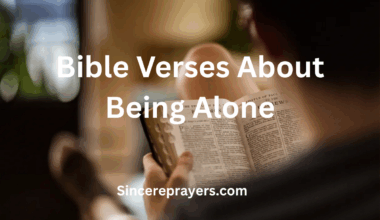Anger is one of the strongest emotions that humans can feel. If left unchecked, it can raise abruptly, burn fiercely, and drive us down regrettable and destructive roads. Bible verses about anger cautions us to be slow to anger and cautious in how we express it, even while anger itself is not always sinful—it can actually reveal a sense of justice or moral outrage. We can control this feeling in ways that glorify God and promote harmony in our relationships by using the wisdom, direction, and correction found in the Bible.
Anger frequently tempts us to act impulsively or reply angrily when we are offended or frustrated. However, God holds us to a higher standard, one that is based on love, forgiveness, and self-control. His Word teaches us that unbridled wrath offends the Holy Spirit, ruins relationships, and leads to immorality. However, when managed with humility and discernment, righteous anger—directed at sin, evil, or injustice—can serve God’s purposes.

From Moses hitting the rock in defiance to Jonah’s rage at God’s clemency for Nineveh, we find both men and women who battled wrath throughout the Bible. These stories serve as a reminder that when one’s heart is not totally given up, even those who are devout can lose control. However, they also demonstrate that God’s grace surpasses our temper. His Spirit changes our hearts, enabling us to react with tolerance and kindness instead of anger and resentment.
God gives us instructions on how to deal with anger in these 35 potent Bible texts. They provide solace to those who are struggling with annoyance, guidance to those who are looking for tranquility, and conviction to those who are struggling with bitterness. In order to stop anger from controlling you and instead use it as a driving force for spiritual development and the development of godly character, ask the Holy Spirit to soften your heart, refresh your mind, and direct your actions as you reflect on each text.
35 Powerful Bible Verses About Anger in 2025
1. Proverbs 15:1
“A gentle answer turns away wrath, but a harsh word stirs up anger.”
This verse teaches the power of words in shaping outcomes. When tempers rise, a gentle response can diffuse tension and prevent escalation. Harsh words, however, fuel conflict and deepen resentment. God’s wisdom calls us to speak with grace and humility, allowing peace to prevail. By choosing calm and compassionate communication, we reflect the character of Christ even in moments of frustration.
2. Ephesians 4:26
“In your anger do not sin: Do not let the sun go down while you are still angry.”
Anger is a natural emotion, but Paul warns that it must not lead us into sin. Unresolved anger festers and grows, hardening the heart. God invites us to seek reconciliation quickly—to forgive, restore, and release offense before it poisons our spirit. This verse encourages us to manage anger with wisdom, humility, and a commitment to peace before the day ends.
3. James 1:19–20
“Everyone should be quick to listen, slow to speak and slow to become angry, because human anger does not produce the righteousness that God desires.”
James gives a divine formula for emotional control. Listening first allows understanding to grow, while restraint in speech prevents unnecessary conflict. Unchecked anger hinders godly living and disrupts relationships. True righteousness flows from patience and empathy, not impulsive reaction. Through self-control and humility, believers reflect God’s peace rather than human pride.
4. Proverbs 14:29
“Whoever is patient has great understanding, but one who is quick-tempered displays folly.”
Patience reveals wisdom, while impulsive anger exposes immaturity. A person who takes time to understand others’ perspectives avoids needless strife. In contrast, those ruled by emotion act foolishly and harm relationships. Godly wisdom calls for restraint, discernment, and compassion. When we pause before reacting, we demonstrate strength under control—a true mark of spiritual maturity.
5. Colossians 3:8
“But now you must also rid yourselves of all such things as these: anger, rage, malice, slander, and filthy language from your lips.”
Paul reminds believers to shed the old sinful nature. Anger, when nurtured, leads to destructive behaviors like bitterness and hostility. By the power of Christ, we can let go of these patterns and walk in holiness. Releasing anger is not weakness but obedience—a surrender that allows God to cleanse our hearts and renew our minds.
6. Psalm 37:8
“Refrain from anger and turn from wrath; do not fret—it leads only to evil.”
This verse warns of anger’s deceptive path. Though it may feel justified, anger often leads to sin when left unchecked. God calls us to let go of wrath and trust Him for justice. By releasing resentment, we guard our hearts from bitterness and open ourselves to divine peace and rest. Surrendering anger is a sign of faith, not defeat.
7. Proverbs 29:11
“Fools give full vent to their rage, but the wise bring calm in the end.”
Wisdom is revealed not by suppression but by control. A wise person channels emotions constructively rather than exploding in fury. Those who vent without restraint create chaos and regret. Godly restraint promotes peace and understanding, turning anger into an opportunity for grace and growth. Self-control demonstrates strength rooted in God’s Spirit.
8. Ecclesiastes 7:9
“Do not be quickly provoked in your spirit, for anger resides in the lap of fools.”
Solomon reminds us that a quick temper reveals spiritual immaturity. When we are easily provoked, we give power to others over our emotions. Wisdom calls for calm discernment and patience. By keeping our hearts anchored in God’s peace, we prevent foolish reactions and maintain spiritual clarity. True strength lies in composure, not rage.
9. Matthew 5:22
“But I tell you that anyone who is angry with a brother or sister will be subject to judgment.”
Jesus elevates the standard of righteousness by addressing anger at its root. Harboring resentment, even without outward action, corrupts the heart. This verse calls us to examine our motives and seek reconciliation quickly. God desires purity of heart and peace among His children. Unresolved anger hinders fellowship and invites divine correction.
10. Proverbs 16:32
“Better a patient person than a warrior, one with self-control than one who takes a city.”
True strength is measured not by force but by restraint. A person who controls their anger is more powerful than a conqueror who overcomes cities. Self-control is a fruit of the Spirit that reflects divine mastery over human emotion. Through patience, we demonstrate God’s victory within us—turning potential conflict into peace.
11. Psalm 4:4
“In your anger do not sin; when you are on your beds, search your hearts and be silent.”
This verse encourages self-reflection in moments of anger. Instead of reacting impulsively, God calls us to quiet contemplation. Silence before Him allows the Holy Spirit to reveal truth and calm emotional storms. Through prayerful reflection, we transform frustration into wisdom and peace. Godly restraint turns anger into an opportunity for spiritual growth and restored fellowship with Him.
12. Romans 12:19
“Do not take revenge, my dear friends, but leave room for God’s wrath, for it is written: ‘It is mine to avenge; I will repay,’ says the Lord.”
This verse teaches that vengeance belongs to God alone. When anger tempts us to retaliate, faith reminds us to trust His justice. Taking matters into our own hands leads to bitterness and sin. By surrendering our right to revenge, we experience freedom and peace. God’s justice is perfect—ours is flawed. Trusting Him brings healing instead of hostility.
13. Proverbs 19:11
“A person’s wisdom yields patience; it is to one’s glory to overlook an offense.”
Wisdom teaches patience and the ability to forgive easily. Overlooking minor offenses reflects inner strength, not weakness. God is glorified when His people choose peace over pride. By forgiving, we break the cycle of anger and preserve unity. This verse calls us to respond to provocation with grace, displaying the calm dignity of those led by the Spirit.
14. Matthew 5:9
“Blessed are the peacemakers, for they will be called children of God.”
Peacemakers are those who choose reconciliation over retaliation. God blesses those who foster harmony amid conflict. By controlling anger and seeking peace, we reflect the very nature of our Heavenly Father. True children of God do not fuel division but heal it through love and forgiveness. This verse reminds us that peace is the hallmark of genuine faith.
15. Galatians 5:19–21
“The acts of the flesh are obvious: … hatred, discord, jealousy, fits of rage … those who live like this will not inherit the kingdom of God.”
Paul lists anger-driven behaviors as works of the flesh, opposing the Spirit’s fruit. Persistent rage distances us from God’s kingdom values. Believers must reject these impulses and yield to the Spirit’s transforming power. The life of faith produces patience, gentleness, and love—fruits that conquer wrath. To follow Christ is to crucify anger and walk in peace.
16. Titus 1:7
“Since an overseer manages God’s household, he must be blameless—not overbearing, not quick-tempered.”
Leaders in God’s kingdom are called to model restraint. Quick tempers damage trust and dishonor God’s people. This verse teaches that leadership rooted in humility and patience reflects divine maturity. Godly authority is gentle, not domineering. Controlling anger isn’t only personal discipline—it’s spiritual leadership that builds others up rather than tearing them down.
17. Psalm 103:8
“The Lord is compassionate and gracious, slow to anger, abounding in love.”
God’s patience is the perfect model for believers. Though humanity continually fails, He responds with mercy. This verse shows that love tempers wrath and compassion overrides judgment. When we imitate God’s slowness to anger, we reveal His heart to the world. Patience rooted in love brings peace to our souls and healing to our relationships.
18. Proverbs 22:24–25
“Do not make friends with a hot-tempered person, do not associate with one easily angered.”
God warns against close companionship with the easily angered, as their behavior can influence us negatively. Prolonged exposure to uncontrolled temper fosters conflict and tension. This verse calls for discernment in relationships, urging believers to walk with the wise and peaceable. Surrounding ourselves with calm, godly influences strengthens our own emotional discipline and spiritual peace.
19. Nahum 1:2–3
“The Lord is a jealous and avenging God … The Lord is slow to anger but great in power.”
God’s anger is righteous and controlled, never impulsive. His wrath arises from holiness and justice, not human emotion. This passage reminds us that anger can be righteous when directed at sin and injustice. However, divine anger is always balanced by patience and mercy. God’s example teaches us to channel anger toward righteousness, not revenge.
20. Proverbs 25:28
“Like a city whose walls are broken through is a person who lacks self-control.”
Self-control guards our hearts as city walls protect against invasion. When we lose temper, we open ourselves to destruction and regret. This verse urges believers to maintain emotional boundaries through the Spirit’s strength. Discipline and restraint secure our peace and preserve relationships. With God’s help, self-control becomes a fortress of protection against the chaos of uncontrolled anger.
21. Jonah 4:4
“But the Lord replied, ‘Is it right for you to be angry?’”
God gently confronts Jonah’s misplaced anger toward His mercy. This question challenges all who feel justified in their wrath. The Lord calls us to examine our motives and align them with His compassion. Often, our anger stems from pride or misunderstanding. God invites us to surrender it and learn grace. His love corrects and transforms us into instruments of mercy.
22. Proverbs 12:16
“Fools show their annoyance at once, but the prudent overlook an insult.”
Immediate irritation exposes immaturity. Wisdom, however, hides offense and seeks peace. When we control our initial reaction, we demonstrate strength of character and reliance on God. Overlooking insults frees us from emotional bondage and maintains dignity. True prudence doesn’t suppress truth but chooses the right time and tone to address wrongs. Self-restraint glorifies God.
23. 1 Timothy 2:8
“Therefore I want the men everywhere to pray, lifting up holy hands without anger or disputing.”
Paul urges believers to approach prayer in purity and peace. Anger hinders effective prayer by hardening the heart. Worship requires a spirit of humility, not hostility. By releasing anger before approaching God, we open ourselves to His presence and power. This verse shows that peace with others is essential for true communion with God.
24. James 4:1
“What causes fights and quarrels among you? Don’t they come from your desires that battle within you?”
James reveals that anger often stems from selfish desires. Conflict arises when pride and unmet expectations rule the heart. Recognizing these inner battles allows God to transform our motives. Peace begins with surrendering our will to His. When our desires align with God’s, anger loses its grip and unity replaces strife among believers.
25. Psalm 145:8
“The Lord is gracious and compassionate, slow to anger and rich in love.”
This verse celebrates God’s enduring patience. His anger is slow, controlled, and motivated by love. As His children, we’re called to emulate that same grace. When we restrain anger and choose compassion, we reflect His divine nature. Patience fueled by love transforms frustration into forgiveness and draws others closer to the heart of God.
26. Micah 7:18
“Who is a God like you, who pardons sin and forgives the transgression … you do not stay angry forever but delight to show mercy.”
God’s mercy outlasts His wrath. His anger is temporary; His compassion eternal. This verse highlights His forgiving nature—a model for our relationships. Holding onto anger contradicts the character of God. Instead, He calls us to release it and choose mercy. True godliness delights in forgiveness, not vengeance, revealing the beauty of divine love.
27. Proverbs 20:3
“It is to one’s honor to avoid strife, but every fool is quick to quarrel.”
Avoiding unnecessary conflict displays wisdom and dignity. Quarrels arise when pride seeks victory rather than peace. God honors those who value harmony over hostility. By controlling anger, we demonstrate humility and strength. The wise walk away from contention, knowing that peace glorifies God far more than proving a point ever could.
28. 2 Timothy 2:24
“And the Lord’s servant must not be quarrelsome but must be kind to everyone, able to teach, not resentful.”
Servants of God represent His character in every interaction. Quarreling and resentment discredit the gospel. Kindness, patience, and gentleness, however, draw others toward Christ. This verse reminds us that effective ministry flows from a peaceful heart. Overcoming anger with grace allows us to teach and love as true ambassadors of Christ.
29. Psalm 30:5
“For his anger lasts only a moment, but his favor lasts a lifetime.”
God’s anger is temporary and purposeful, never vengeful. His favor endures far longer than His wrath. This verse reassures us of His unchanging mercy. Though discipline may hurt for a season, His love restores us to joy. As we imitate His patience, we learn to forgive quickly and let love triumph over anger.
30. Proverbs 21:14
“A gift given in secret soothes anger, and a bribe concealed in the cloak pacifies great wrath.”
This verse illustrates the calming power of humility and reconciliation. Small acts of kindness can dissolve tension and soften hearts. Though not endorsing manipulation, it reminds us that gentleness can turn away wrath. Reaching out with sincerity promotes healing. God blesses peacemakers who pursue restoration with quiet wisdom and love.
31. Numbers 14:18
“The Lord is slow to anger, abounding in love and forgiving sin and rebellion.”
This declaration of God’s nature reveals His balance between justice and mercy. Though righteous, He delays anger to give time for repentance. His love covers rebellion, showing compassion over condemnation. Believers are called to mirror this patience in relationships. By extending grace instead of wrath, we embody the heart of a forgiving God.
32. Psalm 86:15
“But you, Lord, are a compassionate and gracious God, slow to anger, abounding in love and faithfulness.”
This verse reminds us that God’s restraint flows from His steadfast love. His patience toward us should inspire patience toward others. Anger fades when love and faithfulness lead our actions. Reflecting His attributes transforms relationships and nurtures peace. As God delays anger out of compassion, we too can practice forgiveness through divine strength.
33. Proverbs 10:12
“Hatred stirs up conflict, but love covers over all wrongs.”
Love is the antidote to anger. Hatred multiplies conflict, while love mends wounds and restores peace. This verse calls believers to choose love even when offended. Forgiveness silences bitterness and replaces hostility with grace. When we let love lead, anger loses its power, and God’s peace reigns in our hearts and communities.
34. Mark 3:5
“He looked around at them in anger and, deeply distressed at their stubborn hearts, said to the man, ‘Stretch out your hand.’”
Jesus’ anger here is righteous—born from grief over hardened hearts. His response, however, is not violence but healing. This verse shows that anger can align with God’s purpose when it motivates restoration rather than revenge. Righteous anger defends truth and compassion simultaneously. Christ’s example teaches us to act in love, even when grieved.
35. Proverbs 15:18
“A hot-tempered person stirs up conflict, but the one who is patient calms a quarrel.”
This verse concludes with timeless wisdom: patience diffuses tension, while temper intensifies strife. A peaceful spirit turns away wrath and builds harmony. Anger only escalates division, but calm responses bring healing. God’s children are called to be peacemakers, modeling the serenity and self-control that reflect His presence within.
Conclusion
Depending on how it is managed, anger is a strong emotion that may either discipline or destroy. The Bible cautions us against letting anger drive us to sin, but it does not condemn anger per se—rather, it acknowledges it as a natural human emotion. Scripture exhorts us to examine our hearts, control our emotions, and channel our rage into a constructive rather than destructive force. Godly rage opposes injustice, but it never opposes love.
We can clearly detect a trend in these 35 verses: whereas unchecked anger leads to chaos, controlled anger results in harmony. God wants His people to be as kind, patient, and compassionate as He is. He is full of unwavering love, slow to anger, and displays divine maturity through his restraint. He changes our anger into forgiveness, our rage into gentleness, and our suffering into peace when we give Him control over our feelings. The Holy Spirit gives us the grace and self-discipline to moderate our anger.
In the end, overcoming wrath requires heavenly submission rather than human willpower. We ask God’s Spirit to quiet our hearts and change our reactions as we reflect on His Word. We learn to love even when we are wronged, to forgive even when we are injured, and to bless even when we are provoked through prayer, repentance, and humility. By living according to this reality, we not only preserve our peace but also emulate Christ, who vanquished evil with love and wrath with kindness.





